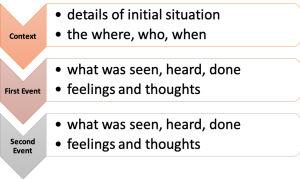5.2 Planning and Drafting the Narrative
The Outline
Once you have decided a topic for your narrative essay, before you start to write, you should develop a plot outline showing the significant event of your narrative.

The Thesis Statement
Ensure that your narrative essay express a main point. Your thesis statement should have a controlling idea. For example:
topic controlling idea
The day I decided to get a new job, my life took a dramatic turn.
controlling idea topic
Sadie’s problem began as soon as she drove here new car home.
Tips
How to make a point
In a narrative essay, the thesis statement should make a point. To help you find the controlling idea, you can ask yourself the following questions:
- What did I learn?
- How did it make me feel?
- How did I change?
- What is important about it?
For example:
Topic: ran away from home
Possible controlling idea: learned the importance of family
Topic controlling idea
When I ran away from home at the age of fifteen, I learned the importance of my family.
Exercise 5.2.1. Writing Thesis Statements
Write a thesis statement for each of the following topics. Each thesis statement should mention the topic and express a controlling idea.
Example: Topic: A memorable moment
Thesis Statement: I made a mistake when I ran away from home to meet a pen pal.
- Topic: An emotional ceremony
Thesis Statement: ______________________________________________________
- Topic: A significant experience
Thesis Statement: _______________________________________________________
- Topic: An adventure with a friend
Thesis Statement: _______________________________________________________
The Supporting ideas
A narrative essay should contain specific details so that the reader understands what happened. To come up with the details, ask yourself a series of questions and then answer them as you plan your essay.
- Who is the essay about?
- What happened?
- When did it happen?
- Where did it happen?
- Why did it happen?
- How did it happen?
Tips
Here are some tips to remember as you develop your narrative essay.
- Do not simply recount what happened. Reflect on why the event is important.
- Consider the main source of tension in your narrative. Descriptions of conflict or tension can help engage the reader.
- To make your essay more powerful, use descriptive language that appeals to the senses.
Exercise 5.2.2. Developing Supporting Ideas
Choose one of your thesis statements from the exercise above, and generate supporting ideas. List what happened.
Example:
Thesis Statement: When I ran away from home at the age of fifteen, I learned the importance of my family.
Supporting Details:
– had an argument with parents
– decided to run away from home
– packed my stuff and left a note
– went to arcade to play games
– ran out of money
– tried to find a job
– my father came to take me back home
– had a conversation with parents
– apologized to each other
– realized the importance of family
Topic:
Thesis Statement:
Supporting details:
–
–
–
Useful transitional words in narrative essays
Narrative writing often follows a chronological order. Here is a list of transitions that are useful in narrative essays.
| To show a sequence of events |
| after that finally in the end meanwhile afterward first next
eventually in the beginning later then last |

